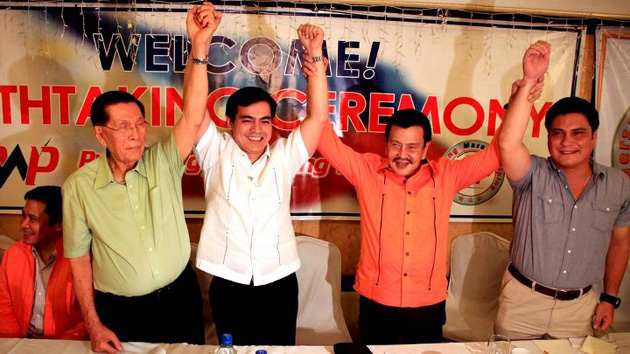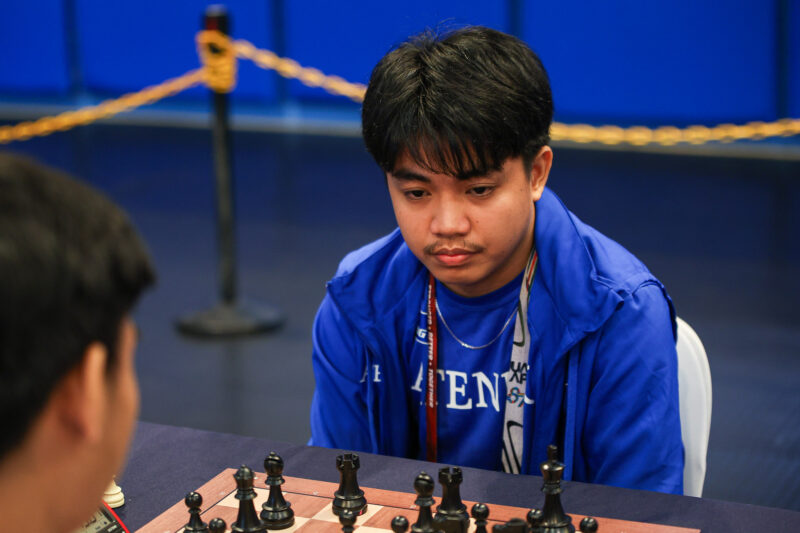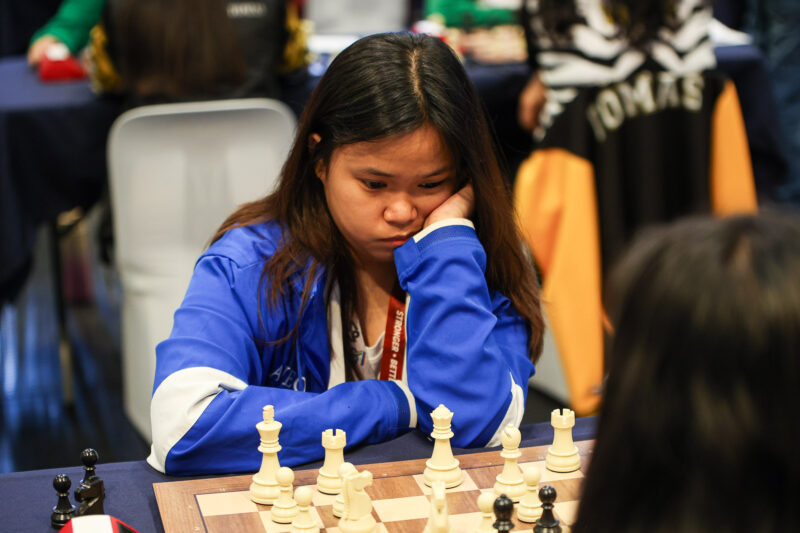
INCOMPATIBLE. Senator Aquilino “Koko” Pimentel III said he cannot run under the United Nationalist Alliance with former Senator Juan Miguel Zubiri (rightmost), who, Pimentel says, “took away four years” of his six-year term as senator. Photo by ALEX NUEVAESPAÑA, for the Senate website
NEXT YEAR’S elections are likely to see the still unnamed administration coalition, led by President Benigno Aquino III and his Liberal Party (LP), and the opposition’s United Nationalist Alliance (UNA), led by the triumvirate of Vice President Jejomar Binay, former president Joseph Estrada and Senate President Juan Ponce Enrile, slug it out in the elections for the Senate, House of Representatives and local government positions.
It is no surprise that election-related events have presently caught public attention, first of which is the rift between Sen. Koko Pimentel and former Sen. Miguel Zubiri, which has led to Pimentel’s defection from the UNA slate. However, Pimentel and Zubiri’s case is in fact merely the public face of the fickle alliances that characterize every election cycle.
UNA seems to have been more accommodating than its counterpart. Since its creation in April 2012, the coalition has been engaged in an “open-door strategy,” rapidly increasing party ranks with prominent recruits, some of which are known allies of former president Gloria Macapagal-Arroyo.
UNA spokesperson and secretary-general, Navotas Representative Toby Tiangco, defends UNA’s strategy. “Identification with the former administration does not automatically disqualify you from joining any party. Even if they’re close to the former administration, they haven’t done anything wrong and have no cases filed against them, so who are we to stop them [from joining]?” he says.
Denying that UNA has accepted them for electoral gain, Tiangco says, “No. We just want to move forward. We don’t want to brand people as this and that, we want reconciliation.” He further clarifies that whoever has been convicted of corruption or cheating will definitely be hindered from joining the coalition.
Tiangco criticizes the LP’s seemingly inflexible stand. “[This government] seems to be a vindictive government that keeps on looking [at] the past,” he adds.
For his part, Quezon Representative Erin Tañada, LP spokesperson, says, “We are simply putting them [Arroyo government officials] accountable first for their actions.”
When asked about holding Aquino officials accountable too, he says, “with regard to government officials of the president, they should also be held accountable… It’s just that, now, we haven’t received any complaints.”
Two facets of one coalition
Despite their imminent collision in 2013 and, probably, 2016, UNA and LP have enjoyed a good relationship so far. The two coalitions have rarely clashed with one another, almost unprecedented in the usually polarized nature of Philippine politics.
According to Tiangco, “Elections or no elections, we will support the good programs of the Aquino administration. But, if we think that a program needs improvement, we will also not keep quiet about it.”
The LP spokesperson also holds the opposition in high regard. “We consider them a formidable team; they’re all qualified. At the end of the day, it will depend on the program of the administration slate in the coming election,” Tañada says.
This is also a fact that seems to be overlooked: UNA and LP are technically allies. Both belong to the majority coalition in Congress led by House Speaker Feliciano Belmonte. In fact, Tiangco notes, “Actually, there is no UNA in Congress. There are only PMP and PDP-Laban. This just shows that we are supportive of the programs of the Aquino government.”
Political Science lecturer Arjan Aguirre makes some observations. He says, “The preparations by the two parties are very natural for Philippine political parties.”
Asked to comment on why UNA is not directly opposing the LP, he says, “The Aquino administration has sustained a level of popularity. While we criticize the government for individual issues, they have yet to face an antagonistic, oppositional attitude from the people.”
“Multiparty”
While the two leading coalitions may be cooperating in many areas, differentiating them is now a challenge.
Party membership in the country has been notoriously fluid. With every election characterized by shifting, fickle alliances, one is compelled to ask: are such national political formations still significant?
Tañada believes so, and reiterates the role that the ruling party (LP) has to make: “It is incumbent for the administration party to continue with political education, political maturity, and I think there are certain initiatives in the Senate, especially the one about political turncoatism, that would also help minimize butterflies.”
He is referring to Senate Bill 3214, more commonly known as the “Anti-balimbing bill,” which gives political parties subsidies and imposes penalties on political butterflies.
Tiangco agrees, but only with regard to the national level. “The problem there is, it is allowed by the constitution. We are in a multiparty system. So there is no stopping any politician or public official from transferring from one party to another. The only issue, if there is [any], is a moral and ethical issue. If these people still win, it just means people have accepted [and] tolerated it,” he explains.
However, Tiangco does not say the same thing about localities. He says that this is “because [the] local politician, assuming that he is doing well, is much closer to the people than the local party.”
For Tañada, the mere fact that the LP has not been an open door to all applicants should be a sign of its sincerity, saying that the LP has “a process of consulting the party organ in the municipalities, and ask them if they have any objections, [so those] who want to join the Liberal party are not immediately accepted.”
What issue?
Seventy years ago, President Manuel Quezon famously said, “My loyalty to my party ends where my loyalty to my country begins.” This quote correctly predicted how Filipino politicians would eventually behave about parties.
The “moral and ethical” problem of switching, as Tiangco put it, has not been much of a problem. Of the six senators eligible for re-election, three have switched parties or status since the last election. Some local officials change parties almost every election.
However, Aguirre notes, “This is [simply] the reality of Philippine politics.” On the imminent confrontation between UNA and LP, he says, “this non-difference between these two parties tells us of the very character of political parties in the Philippines. They are basically election-oriented. We have yet to see the emergence of platform, program-based parties.”
As the law itself has been unable to change this system, it only means that this is not an issue with simple solutions. Voters, after all, change their preferences as easily as the parties do. This is multiparty democracy, chaotic as it may be. For now, voters will still have their choices to make.




